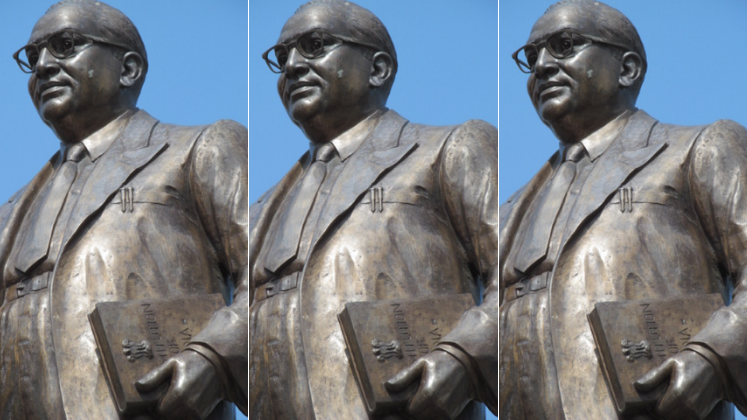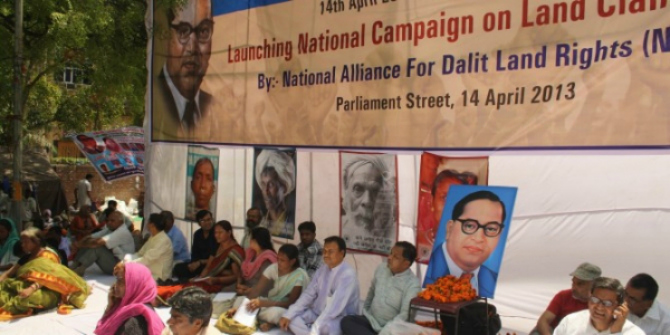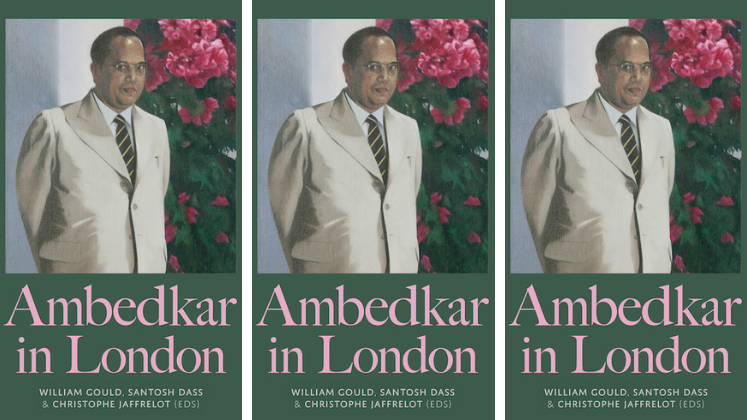In The Evolution of Pragmatism in India: Ambedkar, Dewey, and the Rhetoric of Reconstruction, Scott Stroud examines the influence of the philosopher John Dewey on Bhimrao Ambedkar, a chief architect of India’s constitution. Stroud’s argument, grounded in archival research, persuasively demonstrates how Dewey’s pragmatism shaped Ambedkar’s thought and actions on historical, conceptual and methodological levels, writes Luis Cabrera.
The Evolution of Pragmatism in India: Ambedkar, Dewey, and the Rhetoric of Reconstruction. Scott R. Stroud. University of Chicago Press. 2023.
 There may be no more painstaking student of the intellectual journey of Bhimrao Ramji Ambedkar, India’s revered constitutional architect and anti-caste crusader, than Scott Stroud. No clue is too small – from Ambedkar practicing his signature on a scrap of paper, to notes in the margins of academic books he owned, to recollections of the avid notes he took as a doctoral student at Columbia – to be put under Stroud’s detective’s glass as he investigates the influence that John Dewey’s pragmatism came to exercise on Ambedkar’s thought and modes of action.
There may be no more painstaking student of the intellectual journey of Bhimrao Ramji Ambedkar, India’s revered constitutional architect and anti-caste crusader, than Scott Stroud. No clue is too small – from Ambedkar practicing his signature on a scrap of paper, to notes in the margins of academic books he owned, to recollections of the avid notes he took as a doctoral student at Columbia – to be put under Stroud’s detective’s glass as he investigates the influence that John Dewey’s pragmatism came to exercise on Ambedkar’s thought and modes of action.
Ambedkar is venerated by the hundreds of millions of Dalits in India and the diaspora, and his birthday is officially observed in India. He also has increasingly been recognised as a significant legal and political thinker globally, with an ever-expanding literature chronicling his life and thought.
Ambedkar (1891-1956), was born into a Mahar Dalit (formerly ‘untouchable’) family, and he faced the deep exclusions typically attending that status. He went on, however, to earn doctoral degrees at both Columbia and the London School of Economics and was called to the bar at Gray’s Inn London. Returning to India, he gained fame as a champion of Dalit rights who, unlike his sometime rival Mohandas Gandhi, called for the total Annihilation of Caste – the title of his best-known work, published in 1936. Ambedkar ultimately was selected by inaugural post-Independence Prime Minister Jawaharlal Nehru to lead the drafting of India’s 1950 Constitution, and he later led hundreds of thousands of followers out of Hinduism into a Navayana Buddhism of his own design. Today, Ambedkar is venerated by the hundreds of millions of Dalits in India and the diaspora, and his birthday is officially observed in India. He also has increasingly been recognised as a significant legal and political thinker globally, with an ever-expanding literature chronicling his life and thought.
On Dewey’s death, [Ambedkar] would say in a letter to his wife Savita that, “I owe all my intellectual life to him. He was a wonderful man”
Stroud, a professor of Communication Studies at the University of Texas-Austin, who has previously explored Kant’s connections to rhetorical traditions and Dewey’s to aesthetics, focuses in The Evolution of Pragmatism in India on Ambedkar’s rhetorical and other inheritances from Dewey. Ambedkar first encountered Dewey at Columbia, and he was described as a voracious student of material presented in Dewey’s courses. On Dewey’s death he would say in a letter to his wife Savita that, “I owe all my intellectual life to him. He was a wonderful man” (Stroud 2023, 2).
While Stroud acknowledges that Ambedkar absorbed many other influences in his studies within India and without, he argues that:
To fully understand Ambedkar as an anticaste activist and theorist, and to see what informed his passion and creativity in regard to Buddhism, one must come to terms with Dewey and his form of pragmatism as Ambedkar saw, heard and read it early in his educational development. Pragmatism … represents a thread that runs through many of Ambedkar’s projects, activities and works (12).
Dewey (1859-1952) was in his mid-50s by the time Ambedkar arrived in New York in 1913, on scholarship from the hereditary ruler or Gaikwad of Baroda, in present-day Gujarat State. Dewey by that time had already served as president of both the American Psychological Association and American Philosophical Association, and he had made significant contributions in both fields, as well as to educational theory and practice.
Stroud’s focus is Dewey’s pragmatism, or emphasis on practical inquiry and experience in philosophy and its applications.
Stroud’s focus is Dewey’s pragmatism, or emphasis on practical inquiry and experience in philosophy and its applications. He explores its influence on and adaptation and development by Ambedkar. Specifically, he sets out to demonstrate that Dewey’s pragmatist thought was crucial to Ambedkar’s development in historical terms, “as the author of books that mattered to Ambedkar;” in conceptual terms of common ideals they shared, e.g., social democracy; and methodologically, “as sharing a process of reconstructive meliorism,” or an aim to improve social conditions (20). To make his case, Stroud draws on extensive archival work to identify such influences. He also does some outright detective work, tracking down in India books by Dewey and others that Ambedkar had owned, and in which he made notes. He relates discovering in Ambedkar’s well-worn copy of Dewey’s The Influence of Darwin on Philosophy, a scrap of paper on which the student Ambedkar had practiced his own signature – and on which he also practiced writing the name ‘John’ several times (6).
[Stroud] sets out to demonstrate that Dewey’s pragmatist thought was crucial to Ambedkar’s development in historical terms, ‘as the author of books that mattered to Ambedkar;’ in conceptual terms of common ideals they shared, e.g., social democracy; and methodologically, ‘as sharing a process of reconstructive meliorism,’ or an aim to improve social conditions.
Stroud begins his detective story in Chapter 1 with a focus on the detailed content of three courses Ambedkar took from Dewey at Columbia, reconstructed from Dewey’s own notes, handouts and Ambedkar’s and other students’ notes. Chapter 2 examines Ambedkar’s shift from economist and student of social phenomena to critic and advocate, with emphasis on a review article of a Bertrand Russell book he wrote, titled “Mr. Russell and the Reconstruction of Society.” For Stroud, the piece “marks the most evident start of Ambedkar’s project of reconstructive rhetoric, or his attempt to fashion and refashion problematic habits, customs, and institutions in readers or public through acts of persuasive speech and writing” (70).
Chapter 3 focuses on how Ambedkar turned that rhetoric more directly to a critique of the caste system, focusing on his testimony to the 1919 Southborough Committee on political representation for groups in imperial British India, in which he drew on and adapted material from Dewey’s seminal 1916 work, Democracy and Education. Chapter 4 examines Ambedkar’s own seminal text, Annihilation of Caste, and how it evinces both an adaptation and departure from, and development on, Dewey’s pragmatism. Chapter 5 focuses on Ambedkar’s approach to promoting social and political change, with emphasis on his modes of non-violent persuasion, education and reform. Such efforts are presented as culminating in Ambedkar’s leading hundreds of thousands of followers in conversion to Buddhism, a religion that he saw as fundamentally grounded in equality.
Stroud acknowledges throughout that Ambedkar had other influences besides Deweyan pragmatism […] but the book is indeed very persuasive that to fully understand Ambedkar, one must understand his relationship with Dewey.
Stroud acknowledges throughout that Ambedkar had other influences besides Deweyan pragmatism, and indeed alternate narratives could focus on how universalist moral traditions focused on principles of equality and rights were prominent in some of Ambedkar’s most powerful rhetoric and claims. But the book is indeed very persuasive that to fully understand Ambedkar, one must understand his relationship with Dewey. If there is one area in which the narrative might have been strengthened, it would have been in the initial establishment of Ambedkar’s importance as an agent of social and political change in India, and a thinker increasingly appreciated worldwide. A more extended treatment at the beginning of the book could have helped establish for those not already steeped in Ambedkariana why they should want to take such a relatively deep dive into it. Ambedkar’s legacy and importance become clearer throughout the book, however, and overall it is hard to imagine a more careful and compelling exploration of how Dewey’s thought influenced Ambedkar’s own thought and actions.
Note: This review gives the views of the author, and not the position of the LSE Review of Books blog, or of the London School of Economics and Political Science. The LSE RB blog may receive a small commission if you choose to make a purchase through the above Amazon affiliate link. This is entirely independent of the coverage of the book on LSE Review of Books.
Image Credit: PradeepGaurs on Shutterstock







